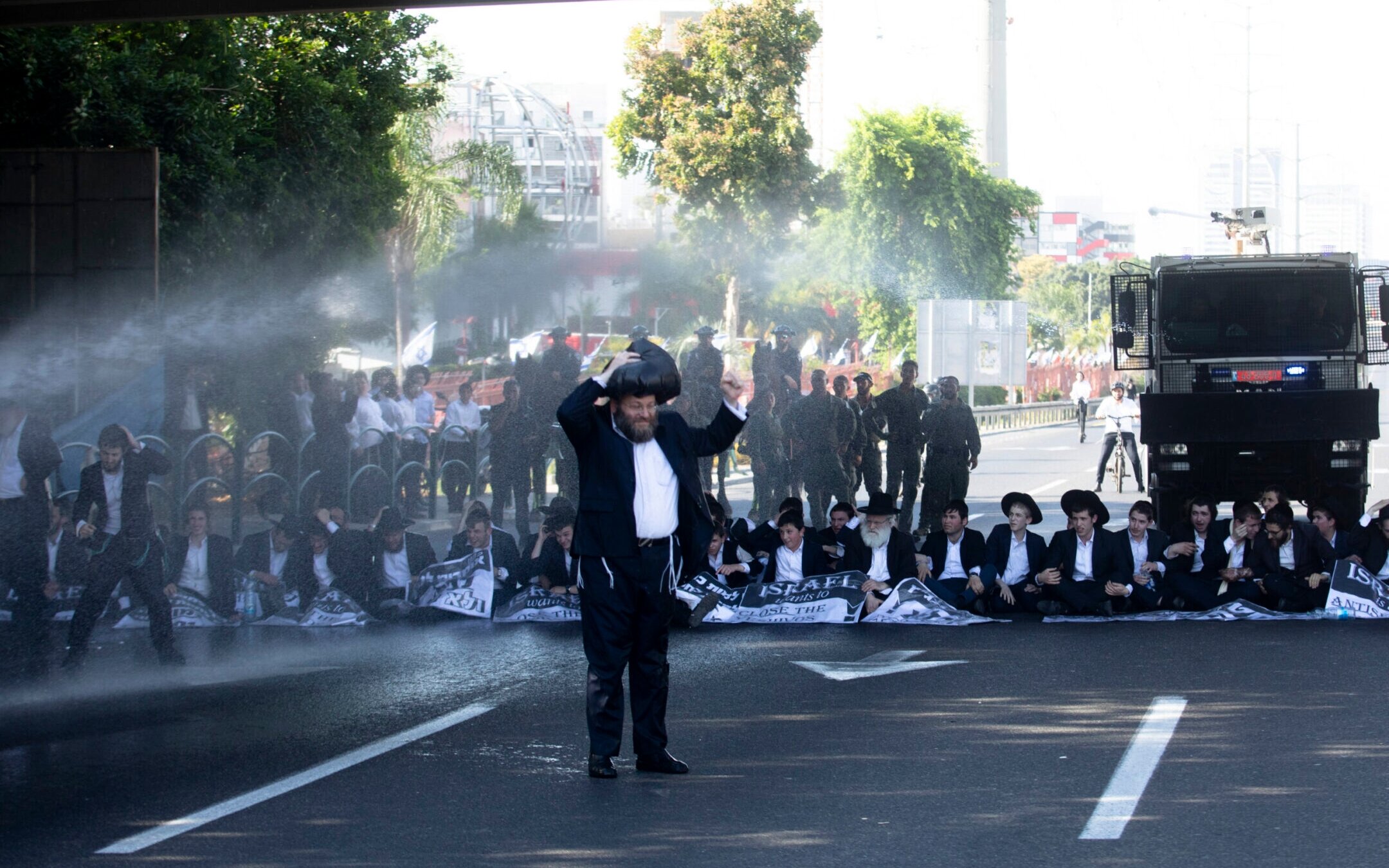In landmark ruling, Israel’s top court rules that haredi Orthodox Jews must serve in the army
The ruling could be a major jolt to Israel’s governing coalition.

Police officers use water cannons as haredi Orthodox Jewish men block a main highway during a protest against drafting into the Israeli army on June 2, 2024 in Bnei Brak, Israel. (Amir Levy/Getty Images)
(JTA) — Israel must draft haredi Orthodox Jews into its army, the country’s Supreme Court ruled in a unanimous decision Tuesday.
The ruling could trigger a political earthquake in Israel at a time when it is already embroiled in a war in Gaza and has seen social unrest at home. The requirement to begin drafting more than 60,000 fervently Orthodox men into the army could lead to a sea change in military procedure, mass haredi street protests and the breakup of Prime Minister Benjamin Netanyahu’s government, which includes haredi parties that are irrevocably opposed to mandating haredi conscription.
For decades, Israel has offered a blanket exemption from the army for young men enrolled in full-time learning in yeshivas, an accommodation first instituted in the country’s early years when relatively few people fell into that category. As the haredi Orthodox population has ballooned, debate over continued exemptions from a draft that many Israelis see as a national duty has become increasingly heated and led to the rise and fall of multiple governments.
Previous attempts to conscript haredim have fallen flat despite majority support from the public. Proponents argue that the exemptions create inequity in Israeli society and deprive the Israel Defense Forces of needed manpower.
Haredi leaders contend that Torah study has inherent value and serves to protect the state, and that accommodating the religious needs of haredi men would itself be a burden for the army. Haredi leaders supported Netanyahu’s effort last year to sap the power of the Supreme Court in large part so they could avoid a ruling such as the one handed down on Tuesday.
Since Oct. 7, concerns over manpower and inequality have been exacerbated by the war against Hamas, which spurred the largest military mobilization in Israel’s history, with many soldiers spending months in the reserves. When the latest blanket exemption law expired last year, Israel’s right-wing government decided to continue not conscripting yeshiva students, but that decision has since drawn criticism from some of Netanyahu’s allies as well as his critics.
Now, nine judges on Israel’s High Court have ruled that the government must begin conscripting haredi men — and also cannot continuing funding yeshivas that enroll haredi men in lieu of army service. They cited the war as a reason for their decision.
“In these days, in the midst of a severe war, the burden of inequality is more acute than ever — and requires the promotion of a sustainable solution to this issue,” the judges wrote.
Exactly when and how the ruling would be carried out was not immediately clear; the judges referred to “gradual conscription of yeshiva students.” It could also be possible for the government to pass new legislation carving out an exemption, though it is unlikely that such a law could gain majority support in any coalition.
The ruling drew immediate criticism from leaders of religious parties who vowed to fight it. “There has never been a ruling by the Supreme Court in favor of the members of the yeshiva and in the interest of the haredi public,” tweeted Moshe Gafni of United Torah Judaism. “There is not a single judge there who understands the value of learning the Torah and their contribution to the people of Israel in all generations.”
One haredi leader said the ruling could lead to “two states” — split not between Israelis and Palestinians but between haredi and non-haredi Jews.
It also drew applause from longtime critics of the exemptions, several of whom used the phrase “There are judges in Jerusalem,” a likely apocryphal quote from former Israeli Prime Minister Menachem Begin frequently cited by Israelis praising legal rulings, in their statements.
“Today a new page was written in the history of the State of Israel,” the Movement for Quality Government in Israel, a nonprofit that has spearheaded public advocacy on the issue for decades and filed the petition in the latest case, said in its statement.
“In a year in which we lost an entire brigade of soldiers who fell in battle or were seriously injured, in a year in which reservists served over 200 days, there is no more justified proof that the IDF needs more personnel,” tweeted Avigdor Liberman, who heads the right-wing secularist Israel Beytenu party. He added, “I congratulate the Supreme Court on this decision. It is a significant step on the way to historical change.”
A message from our Publisher & CEO Rachel Fishman Feddersen

I hope you appreciated this article. Before you go, I’d like to ask you to please support the Forward’s award-winning, nonprofit journalism so that we can be prepared for whatever news 2025 brings.
At a time when other newsrooms are closing or cutting back, the Forward has removed its paywall and invested additional resources to report on the ground from Israel and around the U.S. on the impact of the war, rising antisemitism and polarized discourse.
Readers like you make it all possible. Support our work by becoming a Forward Member and connect with our journalism and your community.
— Rachel Fishman Feddersen, Publisher and CEO

























